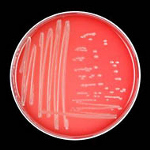National Reference Laboratory for Escherichia coli (NRL E. coli)

Bacteria of the species Escherichia coli (E. coli) are naturally occurring commensals (they do not harm their host) comprising part of the intestinal gut microbiota of birds, warm-blooded mammals and humans. Some strains of E. coli are, however, pathogenic and can cause serious diseases in animals and humans including the Shigatoxin-producing E. coli (STEC), also called verotoxin-producing E. coli (VTEC), that are important food-borne pathogens. These strains produce Shigatoxins and cause symptoms in humans ranging from (bloody) diarrhea to hemolytic uremic syndrome (HUS). Therefore, they are also referred to as enterohemorrhagic E. coli. In severe and complicated cases, the disease can result in long-term health damages (e.g. kidney failure) or even death.
STEC infections are reported worldwide and are mainly due to the consumption of contaminated raw or insufficiently heated food products of animal origin (e.g. raw milk products, game or beef products). In addition, plant based foods like lettuce or sprouts can also be contaminated with STEC. In 2011, numerous HUS cases were linked to the consumption of STEC contaminated sprouts. As a result, more than 50 people died in Germany.
The National Reference Laboratory for Escherichia coli, including verotoxin-producing E. coli (NRL E. coli) is located at the BfR. The NRL focuses on the detection of virulence properties in, as well as the serotyping and molecular differentiation of, pathogenic E. coli isolates from various test materials (food, animal, and environment). Given the large number of virulence and pathogenicity factors described for E. coli, the NRL E. coli works continually on the improvement, development and standardization of methods for detection, isolation and characterization of this pathogen.
Primary foci of the NRL E. coli
- Performance of duties within the framework of the Zoonoses Directive 2003/99/EC
- Serotyping of E. coli according to Orskov and Ewing (identification of 181 O-(lipopolysaccharide) and 56 H-(flagellar) antigens)
- Immunological methods (Shigatoxin ELISA)
- Rapid detection using PCR and real-time PCR
- Molecular typing/ strain differentiation (using real-time PCR, whole genome sequencing, PFGE)
- Participation in the identification and clarification of infection chains and food-borne outbreaks
- Organisation of and participation in multi-laboratory studies (proficiency tests and ring trials)
- Development and optimisation of methods for the detection of pathogenic E. coli
- Management and maintenance of an E. coli strain collection
- Providing assistance, scientific expertise and training courses
